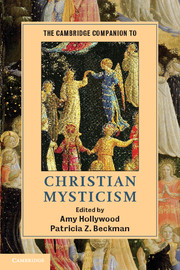Book contents
- Frontmatter
- Contents
- Contributors
- Introduction
- Part I Contexts
- Part II Key Terms
- Part III Contemporary Questions
- 13 Latin and the Vernaculars
- 14 Transmission
- 15 Writing
- 16 The Body and Its Senses
- 17 Mysticism and Visuality
- 18 Emotion
- 19 Authority
- 20 Gender
- 21 Sexuality
- 22 Time and Memory
- Select Bibliography of Christian Mystical Texts up to around 1750
- Select Bibliography of Modern Works Related to the Study of Western Christian Mysticism
- Author and Artist Index
- General Index
- References
20 - Gender
from Part III - Contemporary Questions
Published online by Cambridge University Press: 05 December 2012
- Frontmatter
- Contents
- Contributors
- Introduction
- Part I Contexts
- Part II Key Terms
- Part III Contemporary Questions
- 13 Latin and the Vernaculars
- 14 Transmission
- 15 Writing
- 16 The Body and Its Senses
- 17 Mysticism and Visuality
- 18 Emotion
- 19 Authority
- 20 Gender
- 21 Sexuality
- 22 Time and Memory
- Select Bibliography of Christian Mystical Texts up to around 1750
- Select Bibliography of Modern Works Related to the Study of Western Christian Mysticism
- Author and Artist Index
- General Index
- References
Summary
As an abstraction, Christian mysticism is a religious experience for which sexual difference and gender roles are irrelevant. Whether one focuses on mysticism as infused knowledge of divine mysteries, a transitory noetic state of consciousness, or a complex of corporeal and cognitive practices, Christian mysticism conveys the promise of Galatians 3:28: “There is no longer Jew or Greek, there is no longer slave or free, there is no longer male and female; for all of you are one in Christ Jesus.” But although spiritual equality is a matter of Christian doctrine, gender has had a profound impact on the perception of individual mystics and has played a fundamental role in determining how those individuals are remembered. Furthermore, gender roles have shaped the performance of mysticism – the acts, words, and gestures with which mystics have presented themselves to others.
Undoubtedly gender continues to play a role in contemporary practices of Christian spirituality. For the purposes of this essay, however, I focus on the years from 1200 to 1800, a period that encompasses what Bernard McGinn describes as the flowering and decline of Christian mysticism. Furthermore, I take a broad view of mysticism that considers not only noetic states but also coterminous practices and phenomena such as penitential asceticism, visionary and prophetic gifts, demonic possession, and imputations of sanctity. It might well be argued that this approach distorts mysticism’s meaning as infused knowledge of God and exaggerates the importance of asceticism and supernatural favors in the life of the mystic. I believe, however, that this broader approach is appropriate for the periods under consideration, for mystical knowing was closely associated with what the mystic gave through suffering, received from God, and had available to give to others.
- Type
- Chapter
- Information
- The Cambridge Companion to Christian Mysticism , pp. 315 - 327Publisher: Cambridge University PressPrint publication year: 2012
References
- 12
- Cited by



